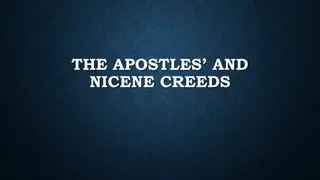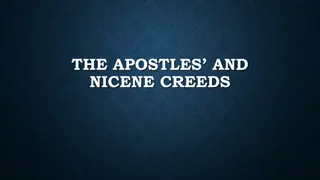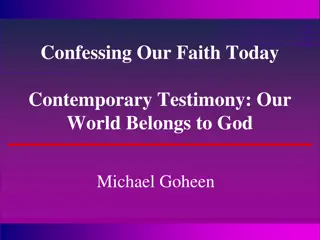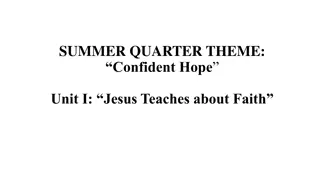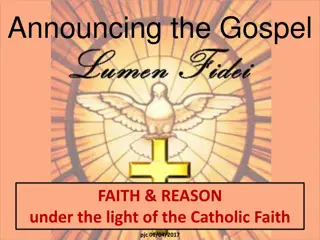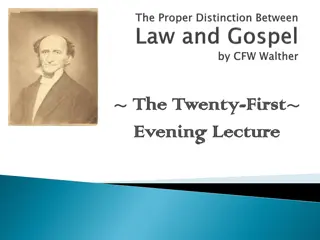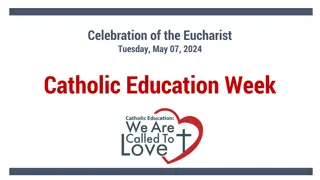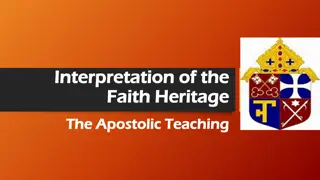The Significance of Creeds in Faith and History
Creeds play a vital role in fostering a common understanding of faith among believers. They encompass beliefs about the Father, Son, and Spirit, with key creeds like the Nicene Creed holding special significance. The Articles of Faith symbolize truths embraced by the Church, highlighting foundational aspects of Christian doctrine. The unity and indivisibility of God are emphasized, revealing His historical presence and the mysterious nature of His revealed name.
Download Presentation

Please find below an Image/Link to download the presentation.
The content on the website is provided AS IS for your information and personal use only. It may not be sold, licensed, or shared on other websites without obtaining consent from the author.If you encounter any issues during the download, it is possible that the publisher has removed the file from their server.
You are allowed to download the files provided on this website for personal or commercial use, subject to the condition that they are used lawfully. All files are the property of their respective owners.
The content on the website is provided AS IS for your information and personal use only. It may not be sold, licensed, or shared on other websites without obtaining consent from the author.
E N D
Presentation Transcript
THE NEED FOR CREEDS A communion in faith requires a common language.
PARTS OF THE CREED I. Of the Father and Creation II. Of the Son and Redemption III. Of the Spirit and Sanctification
NUMEROUS CREEDS There have been numerous church creeds which respond to special needs, such as the Athenasian Creed, the symbol of the Council of Trent, and the Credo of the People of God (Pope Paul VI). Although no creed is ever superseded, two creeds have a special place in the Church. The Apostles Creed is the ancient baptismal symbol of the Church or Rome. The Nicene Creed has its authority from the first two ecumenical councils (Nicea and Constantinople) The catechism will follow the Apostles Creed but will refer frequently to the often more explicit Nicene Creed.
THE ARTICLES OF FAITH An early tradition speaks of the creed containing twelve articles, symbolizing the number of the apostles. Church Fathers called these truths the articles of faith joined together as members of a body
GOD THE FATHER God Is One I believe in one God. The Nicene Creed shows that belief in God s oneness and God s existence are inseparable and fundamental. God is one in nature, substance, and essence. First Truth Creation I believe in God is the most fundamental affirmation, because the whole Creed speaks of God, and man s relationship to Him. The Creed begins with God (the beginning and the end of all creation), with the Father (the First Divine Person), and with creation (the first of God s works.
NO DIVISION THE NAME REVEALED Jesus says there is one Lord and yet, that he is the Lord. Therefore, Christian faith confesses that Jesus is Lord, and the Holy Spirit is the Lord and Giver of Life. Yet, there is no division in God. There is only one true God, eternal, infinite, and unchangeable, the Father, the Son, and the Holy Spirit, three persons but one essence. In the Old Testament, God revealed His name. By doing this, God made Himself more accessible and invited us to know Him better. Although God revealed many names to Israel, the name He used when speaking to Moses was Yahweh I AM WHO AM.
THE GOD OF HISTORY God identified himself to Moses as the God who guided the Patriarchs (Abraham, Isaac, and Jacob). God keeps his promises that he would act within human history.
THE MYSTERIOUS NAME Moses said, "If the people of Israel ask me What is his name?' what shall I say to them?" God said to Moses, "I AM WHO AM" and "Say to this people of Israel, I Am has sent me to you'" (Ex 3:13-15). Although clearly revealed, this name shows that God is hidden yet always close to men. His name shows faithfulness because he was there in the past (the God of your fathers) and he will always be there. "I will be with you" (Ex 3:6, 12).
AWE AND RESPECT Out of respect, Israel did not pronounce the word "Yahweh" but used instead "Adonai" meaning "Lord." Christians used this word "Lord" to affirm Jesus' divinity. "Jesus Christ is Lord" (Phil 2:11). In God's mysterious presence, Moses saw his own insignificance. Others, like Isaiah ("Woe is me! I am lost" - Isa 6:5) and Peter ("Depart from me, O Lord, I am a sinful man" - Lk 5:8) had the same experience of awe in God's presence.
God Forgiving and Merciful No Beginning or End After Israel sinned, God agreed to remain with them (Ex 32-33). He even showed that he was a forgiving God, "a God merciful and gracious" (Ex 34:6). God's name "I Am" shows his faithfulness. By sending his Son, God is "rich in mercy" (Eph 2:4). Jesus had the same divine name: "Then you will realize that I Am'" (Jn 8:28). Over the centuries, Israel realized that God had no end: "Your years have no end" (Ps 102:26- 27). James writes that in the Father, there is "no variation or shadow due to change" (1:17). "I am" means that God alone "is." He has no beginning and no end and from him all creatures receive their existence.
GOD IS LOVE God revealed himself as "abounding in steadfast love and faithfulness. Israel thanked God for this steadfast love and faithfulness. John says "God is love.
GOD IS TRUTH God alone can give us true knowledge about all creation. He is also truthful in revealing himself because he sent Jesus "to bear witness to the truth. "You are God, and your words are true. Because he is truth, we must abandon ourselves to God's Word. Our first parents committed sin because they were led into doubt about God's Word.
God's Motive is Love Through the prophets, Israel discovered that love was God's only motive in revealing himself. God's love is as a father's love. His love is stronger than a mother's love for her children or a bridegroom's love for the bride. Even when the world sinned, "God so loved the world that he gave his only begotten Son" (Jn 3:16). God's love is "everlasting" and will never be removed. "I have continued my faithfulness to you. John reveals God's innermost secret, "God is love. His inner being is an eternal exchange of love between Father, Son and Spirit.
BELIEVING IN ONE GOD HAS ENORMOUS CONSEQUENCES. "WE MUST SERVE GOD FIRST." WE MUST LIVE IN THANKSGIVING. WE MUST RECOGNIZE THE DIGNITY OF EVERY HUMAN PERSON. WE MUST USE CREATED THINGS ACCORDING TO GOD'S PLAN AND WE MUST TRUST IN GOD IN EVERY CIRCUMSTANCE. "GOD ALONE IS ENOUGH. Our Duties
FAITH IN THE TRINITY Christians are baptized "in the name of the Father, and of the Son and of the Holy Spirit." They are not baptized "in the names" of the Father, Son and Spirit because there is only one God, the Most Holy Trinity. The baptismal confession of faith has three parts because "the faith of all Christians rests on the Trinity."
THE CENTRAL MYSTERY The Trinity is the central mystery of Christian life, the source of all the other mysteries, and the most fundamental mystery in "the hierarchy of the truths of faith." The whole history of salvation is identical with the way God revealed himself as Father, Son and Spirit.
THREE ASPECTS How the Church has articulated this mystery How God the Father fulfilled his plan by sending the Son and the Spirit How the Trinity was revealed
INNER LIFE AND EXTERIOR WORK "Theology" refers to God's inner life and "economy" refers to God revealing and communicating his life to us. By God's actions in history (economy), he reveals his inner life (theology). Knowing God's inner life enlightens our understanding of his plan. The Trinity is a mystery which would not be known unless revealed. The mystery is inaccessible both to reason alone and to Israel before the sending of Jesus and the sending of the Holy Spirit.
TWO MEANINGS OF FATHER Many religions call God "Father" meaning "Creator of the world." God was also "Father" as the giver of the Covenant and of the law to Israel, "his first-born Son. He was "Father to the king" and "Father of the poor." God as Father means two things. He created everything and has loving care for all. In the Bible, motherhood also expresses God's tenderness. Although God uses the image of human parents, God is neither man nor woman. No one is father as God is Father.
JESUS FURTHER REVEALED GOD AS FATHER NOT JUST AS CREATOR BUT AS ETERNALLY FATHER TO JESUS, THE ONLY-BEGOTTEN SON. "NO ONE KNOWS THE SON EXCEPT THE FATHER AND NO ONE KNOWS THE FATHER EXCEPT THE SON AND ANYONE TO WHOM THE SON CHOOSES TO REVEAL HIM. JESUS IS THE "WORD" WHO WAS "IN THE BEGINNING WITH GOD" AND "WAS GOD. HE IS "THE IMAGE OF THE INVISIBLE GOD. THE CHURCH DECLARED THAT JESUS WAS "CONSUBSTANTIAL" WITH THE FATHER (NICEA). JESUS IS "THE ONLY BEGOTTEN SON OF GOD, ETERNALLY BEGOTTEN OF THE FATHER, LIGHT FROM LIGHT, TRUE GOD FROM TRUE GOD, BEGOTTEN NOT MADE, CONSUBSTANTIAL WITH THE FATHER" (CONSTANTINOPLE). Jesus' Unique Revealing
THE REVEALING OF THE SPIRIT The Sixth Council of Toledo said that the Father is "the source and origin of the whole divinity." The eternal origin of the Spirit is connected with the Son's origin. "Yet he is not called the Spirit of the Father alone, but the Spirit of both the Father and the Son" (Toledo XI). "With the Father and the Son, he is worshipped and glorified" (Nicene Creed). "We believe in the Holy Spirit, the Lord and giver of life, who proceeds from the Father" (Constantinople). Jesus said he would send "another Paraclete, and revealed the Spirit as a third person together with the Father and Son. When the Spirit was sent to the Church in person by the Father and the Son (after Jesus' glorification) the mystery of the Trinity was revealed in its fullness
RELATIONSHIP TO FATHER AND SON The Nicene Creed says the "Spirit proceeds from the Father and the Son." The Council of Florence says "the Spirit has his nature and subsistence at the same time from the Father and the Son. He proceeds eternally from both as from one principle and through one spiration."
DIFFERENT FORMULAS The Latin liturgy between 700 and 1200 began to say, "the Holy Spirit who proceeds from the Father and the Son." The earlier Council of Constantinople had used a different formula, "the Holy Spirit proceeded from the Father through the Son." Unfortunately, these different expressions of the same truth have constituted a point of disagreement with the Orthodox Churches. The Orthodox formula ("through the Son") stresses the Father as the first origin of the Spirit. The Latin formula ("and the Son") stresses the oneness of the Father and the Son. This Latin formula is valid. The Father and the Son are the single principle from which the Spirit proceeds.
ROOT OF FAITH The Trinity has always been the very root of the Church's faith (expressed in the baptismal liturgy). Paul summarized this apostolic faith in saying "The grace of the Lord Jesus Christ and the love of God and the fellowship of the Holy Spirit be with all of you.
THREE IMPORTANT TERMS In the early Ecumenical Councils, the Church clarified its understanding of the Trinity in order to respond to heresies. The Church developed three important terms: 3. Relation, which designates that their distinction lies in the relationship of each to the others 2. Person, which designates the Father, Son and Spirit in the real distinction among them 1. Substance, (also called essence or nature) which designates the divine being in its unity
ONE GOD The Trinity is one. The Church does not believe in three Gods but in one God in three persons (the "consubstantial Trinity)." The divine persons do not share the one divinity among themselves. Each of them is God, whole and entire. "Each of the persons is that supreme reality, namely, the divine substance, essence or nature" (Fourth Lateran Council).
DISTINCT PERSONS Father, Son and Spirit are not just three names for three modalities of the one God. They are really distinct from one another in their relations of origin. "It is the Father who generates, the Son who is begotten and the Holy Spirit who proceeds" (Fourth Lateran Council).
BASED ON RELATIONSHIPS The real distinction of each Person lies in their relationship to one another. "In the relational names of the persons, the Father is related to the Son, the Son to the Father and the Spirit to both"(Eleventh Council of Toledo). The Father is wholly in the Son and in the Spirit. The Son is wholly in the Father and the Spirit. The Spirit is wholly in the Father and the Son (Council of Florence). "I entrust to you today the profession of faith in the Father and the Son and the Holy Spirit. Each person considered in himself is entirely God.
GOD'S PLAN UNFOLDS The Father "destined us in love to be his sons" through "the spirit of sonship. This plan comes from the Trinity and unfolds in creation in the missions of the Son and the Spirit, and in the mission of the Church.
THE TRINITARIAN MISSIONS The Work of All Three This divine plan is the common work of the three divine persons. However, each person does the work according to his unique personal qualities. "One God and Father from whom all things are and one Lord Jesus Christ, through whom all things are, and one Holy Spirit in whom all things are (Council of Constantinople II). The qualities of the three divine persons are revealed in the missions of Jesus and the Spirit. Revealing Each Person God's work in history reveals the Trinity (what is proper to each divine person and what is proper to their one divine nature). The Christian life is a communion with all three persons. Whoever glorifies the Father glorifies also the Son and Spirit.
INVITING ALL God wants every creature to enter into the unity of the Trinity. Jesus promised, "If a man loves me, he will keep my word, and my Father will love him, and we will come to him, and make our home with him. "O my God, Trinity, help me to forget myself entirely so to establish myself in you, unmovable and peaceful as if my soul were already in eternity.
ALMIGHTY His Almighty Power Of all God's attributes, the Creed speaks only of his almighty power. This power is universal (creating and ruling everything), loving, and mysterious (known only by faith). A Fatherly Care God's almighty power is also fatherly. "I will be a father to you, and you shall be my sons and daughters. God's power is not arbitrary. "Nothing can be in God's power which could not be in his just will or his wise intellect. God is the "Mighty One of Jacob. "Whatever God wills is done. He can do everything in heaven and earth. He is the Lord of the universe governing all events by his will.
GOD'S MYSTERIOUS WAYS In our trials God does seem to be absent and powerless. However. God's power is fully revealed in the death and Resurrection of Jesus. "For the foolishness of God is wiser than men, and the weakness of God is stronger than men. In Jesus' death and Resurrection, God has revealed the "immeasurable greatness of his power in us who believe. Only faith can embrace these mysterious ways of God's power. Mary believed the angel's words that "nothing will be impossible with God" and she proclaimed that "he who is mighty has done great things for me. Knowing that nothing is impossible for God, we can accept everything in the Creed without any hesitation.
THE FIRST ACT OF CREATION "In the beginning God created the heavens and the earth. The Church says that God is the "Creator of heaven and earth" and "of all that is seen and unseen. God's saving plan begins with creation and culminates in Christ who reveals God's plan the glory of a new creation in Christ.
CATECHESIS ON CREATION Challenges to Faith Finding Our Origins The Christian faith faces a challenge from those philosophers who say that the world is God (Pantheism); from those who say the world comes from two sources, good and evil (Dualists and Manicheists); from those who say the world comes from evil (Gnostics); from those who think God created but has no continued interest in the world (Deists); and from those who say there is only the material universe (Materialists). Questions Beyond Science A catechesis on creation lays the foundation for all catechesis by answering the questions, "Where do we come from?" and "Where are we going?" These questions are decisive for life's meaning. . Certainly scientific studies have enriched our knowledge of the cosmos. These discoveries should lead us to thank God for revealing this wisdom. However, some questions go beyond these scientific studies and try to discover the meaning of all creation. Is the universe governed by fate or by an intelligent and good Being called God? Why is there evil and where does it come from?
Need for Revelation First Three Chapters Responses To these questions, human intelligence can give some response. Man can know God's existence with certainty even if this knowing is obscured by error. However, a full understanding comes when reason is helped by faith. "By faith we understand that the world was created by the Word of God. God progressively revealed the mystery of creation in his revelation to Israel. God formed Israel and revealed himself as the Creator. "I am the Lord, who made all things. This revelation about creation and about God's Covenant with Israel are inseparable because creation is God's first step toward the Covenant. The Jewish prophets, liturgy, and wisdom sayings express this witness of God's creation. The first three chapters of Genesis express the truths of creation, its origin, order, and goodness. Genesis shows man's vocation, the drama of sin, and the hope of salvation. These texts are the prime source of catechesis about the beginning mysteries (the creation, the fall, and the promise of salvation).
THREE TRUTHS "In the beginning God created the heavens and the earth" (Gen 1:1). This sentence shows three truths. First, God gave a beginning to all that exists. Second, he alone is Creator. Third, everything depends on God.
THE WORK OF THREE PERSONS John's Gospel says that all things were made through God's Word "and without him nothing was made. The Church also confesses the Holy Spirit's creative action. He is "the giver of life." The Old Testament suggests and the New Testament reveals this creative activity of both the Son and the Spirit. This creative cooperation of the three Persons is confirmed by the Church's rule of faith. "He made all things by himself, that is, by his Word and by his Wisdom, by the Son and the Spirit" who are "the Father's hands.
MANIFESTING AND COMMUNICATING THE GLORY The world was made for the glory of God, "not to increase it but to show it forth and communicate it. Love is the only reason God created. "God created to manifest his goodness" (First Vatican Council). God's glory is the communicating of his goodness to us. "The glory of God is man fully alive" and man's life is the "vision of God. Creation exists "so God can bring about his own glory and our happiness."
THE MYSTERY OF CREATION Freely Willed by God The created world did not happen by necessity, nor by blind chance. God freely willed to create so that every creature would share in his life and goodness. "By your will they existed and were created Starting from Nothing No created thing "pre-existed" nor did creation just emanate from God. "God shows his power by starting from nothing to make all he wants. By creating from nothing, God gives us hope that there is more than a material world. At their martyrdom, the valiant mother told her seven sons, "Look at the heaven and the earth and see everything that is in them, and recognize that God did not make them out of things that existed." Beyond Bodily Life Because God created out of nothing, he can give spiritual life to sinners and bodily life to the dead through the Resurrection. God "gives life to the dead and calls into existence those things that do not exist.
Sharing in God's Goodness Through wisdom, God ordered the universe, especially human persons who are "called into a personal relationship with him. The human intellect can grasp what God tells us through material creation, but only with great effort. Creation is God's gift to man and shares in his goodness. Bringing to Completion Above Yet Present Although God's greatness is unsearchable, he is always present to his creation. "In him, we live and move and have our being. God is "more inward than my most innermost self. God always sustains the whole world and will bring human history to its final goal. Recognizing this total dependence on God is the source of wisdom. "How would anything have endured if you did not will it?



